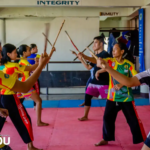The 2025 midterm elections this May aren’t just another trip to the polls. They’re a referendum on President Ferdinand Marcos Jr.’s administration and a glimpse into the nation’s political future. With the deepening divide between the Marcos and Duterte camps, the results will reveal more than just winners and losers; they will signal where the Filipino people stand—whether they remain loyal to either faction or have decided to abandon them both altogether.
United we stand, divided we fall
In the middle of the 2022 presidential elections campaign, the Friedrich Naumann foundation released an article about how personality-driven Filipino elections were that year. The ten presidential candidates of that year were more recognized for their honorifics as opposed to their platforms—former boxing champion, actor, policeman. Parties and their platforms took a backseat in the campaign, with the focus instead on strengthening the candidates’ public personas, which were seen as essential to securing victory.
Beatriz Beato, lecturer in the Ateneo de Manila University and research associate at the Institute of Philippine Culture (IPC), dates this back to the early 1900s when the Nacionalista and Liberal parties in the Philippines were virtually identical, differing only in their candidates.
“Political parties as a concept become more of a vehicle of installing power rather than anything significant,” she shares.
Dynastic politics have been further entrenched by these personality-driven elections, as evidenced by the last election results favoring the son and daughter of former Filipino presidents. What distinguished them, however, was their iron-fist reinforcement of their “unity” as a tandem—one that has slowly been crumbling ever since their win.
The Marcos-Duterte alliance, which secured a landslide victory in the 2022 elections, began to fracture by late 2023, escalating into a full-blown rift in early 2024. Tensions grew as Vice President Sara Duterte accused President Marcos of incompetence and consolidating power, while former President Rodrigo Duterte called Marcos weak and alleged drug use. The divide deepened when the House of Representatives impeached Duterte over budget anomalies and alleged threats, which she dismissed as political maneuvering ahead of the 2028 elections.
In a Rappler survey, many of their 2,700 respondents reported keeping up with news about the split and expressed dissatisfaction over it. The dissatisfaction of the Filipino people may make it more difficult for candidates to rely solely on dynasty-backed name recognition and must instead distinguish themselves through clear policy positions and strategic alliances.
The rift between Marcos and Duterte suggests that Filipino voters will have to pay closer attention to platforms, party ideologies, and political messaging in the coming midterm elections. Beato agrees with this, suggesting that the admin slate now has to buff up its messaging in order to regain the support of the Filipino people.
Both camps are now forced to offer compelling platforms to maintain voter support, and the candidates who will align themselves in either camp will have to subscribe to these ideologies.
Understanding what truly matters to the Filipino people then becomes crucial to winning this election season.
It takes a village
A study by Ereno and Langoyan on Cebuano voting behavior during the 2016 presidential elections discovered that Cebuano voters prefer presidential candidates who prioritize the poor and can create jobs. This didn’t change in the national front during the 2022 presidential elections, with studies showing that voters were more favorable to candidates with frugal campaigns and who prioritize community benefits.
Beato’s research focuses on how communities contribute to the process of democratization. She observed that political science literature is dominated by elite perspectives and, with the help of the IPC, aims to incorporate the voices of the urban poor into this body of research.
“Voting is not something that is not individual,” Beato expresses. “It is located within a larger set of practices, institutions, and values.”
What Beato has found most important in the communities she’s assessed is that politicians can deliver tangible improvements—local officials with a proven track record of meaningful change in their area, win or lose.
These areas tend to use the word kabuti to describe politicians who only show up during election season, avoiding voting for those who fall under this descriptor.
“[Candidates] have to do the work in these communities,” she says. “Maalala nila (they remember) who shows up for them when it counts.”
The Filipino value of malasakit then becomes indispensable in the work of these politicians. Community voters lean toward candidates who have concern for the realities of the people who are living there.
“Voting for them is part of community life but it is situated alongside other issues along the context of their communities,” says Beato.
In Rappler’s survey, these issues include immediate economic needs, job security, and inflation. While middle-income voters focus on broad economic stability and policy, the working class—who make up the majority of the electorate—prioritize concrete solutions to everyday issues over moralistic rhetoric.
This may stem from a sense of disillusionment that Beato has noticed among Filipino voters. “Change is important pero di sila aasa sa mga politicians (they don’t rely on politicians),” she notes.
These voters turn to local organizations—such as sector-based groups and neighborhood associations—that advocate for their concerns to candidates. During election season, these organizations act as intermediaries for national candidates who cannot always be physically present. They engage with politicians, offering to promote their candidacy within their locality in exchange for commitments to address pressing community issues. These groups also play a pivotal role in holding elected officials accountable for their promises.
In political science literature, this system is referred to as the political machine. Beato says that this interaction with community organizations is the most important in winning an election: “If wala kang machinery, you’re a nobody.”
Political machinery sustains dynastic rule and restricts opportunities for emerging politicians. The formula is straightforward: Dynastic politicians with the resources to deliver tangible benefits—most commonly through infrastructure projects—secure the community’s support. Emergent candidates who do not have this established machinery then fall under these communities’ description of kabuti.
This reflects findings on Filipino voting behavior, which indicate that voters tend to favor candidates with strong political machinery, primarily evaluating their financial capacity in relation to local needs and public welfare.
Strength in numbers
While political machinery can game traditional election dynamics, social media has emerged as the most viable platform for introducing new politicians to the public.
In the coming elections, at least 70% of Filipino voters are resorting to social media to inform their vote. Candidates can tap into platform-specific trends, leveraging viral challenges, reaction videos, and algorithm-driven discoverability to reach targeted audiences. With engagement metrics and audience insights readily available for free, politicians can fine-tune their messaging in real time, adapting to what resonates most with potential voters.
However, Beato says that the rise of social media complicates political messaging, making it difficult for candidates to tap into the national zeitgeist.
“There’s always this personality who desires change. It’s not new,” Beato says. “Culture itself does not look the same across social class. What’s popular for people on the ground does not resonate with upper and middle classes. I wouldn’t see it as something that is monolithic.”
Beato suggests alternative forms of media consumption should be made to help inform people’s votes, especially those that can provide information on all officials instead of just highlighting clickable names as traditional media does or aligning beliefs as social media does.
The cycle of traditional politics in the Philippines is not unbreakable—it is simply sustained by limited access to alternative media, deeply ingrained political habits, and the dominance of personality-driven campaigns. But as Beato points out, hope lies in the grassroots, where communities are already organizing around shared concerns rather than personalities.
“Often we are very blinded by these very arbitrary divides when in fact a lot of us have very common concerns. All of us want a better society,” comments Beato.
Reimagining election campaigns means shifting the focus from familiar names to pressing issues. Who are the voices that should be heard? Who will be held accountable for addressing the needs of the people? These are the questions that should drive political engagement, not just during elections but long after the votes are cast.
The challenge now is expanding this spirit of collective action beyond local communities and into the national consciousness. As Beato puts: “Wala naman political allegiance ang gutom (Hunger has no political allegiance).”



